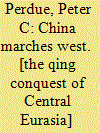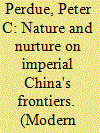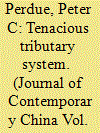| Srl | Item |
| 1 |
ID:
062767


|
|
|
|
|
| Publication |
Cambridge, Harvard University Press, 2005.
|
| Description |
xix, 725p.Hbk
|
| Standard Number |
067401684X
|
|
|
|
|
|
|
|
|
|
|
|
Copies: C:1/I:0,R:0,Q:0
Circulation
| Accession# | Call# | Current Location | Status | Policy | Location |
| 049767 | 951.03/PER 049767 | Main | On Shelf | General | |
|
|
|
|
| 2 |
ID:
089363


|
|
|
|
|
| Publication |
2009.
|
| Summary/Abstract |
Ecologies of production and state classifications shaped Chinese imperial frontier policies. In Chinese classical debates about the effect of environment on human character, the dominant view held that all peoples could become civilised, but a dissenting view held that barbarians could never change their ways. Nomadic pastoralists likewise debated whether to adopt certain Han cultural practices or reject them. Chinese dynasties often accepted diversity, but at certain times tried to eliminate difference by persuasion or by force. Three cases illustrate these processes during the Qing period: the relationship between Manchus and Mongols, Qing policies towards aboriginal peoples and the settlement of Taiwan, and Qing policies towards southwestern mountain peoples. In each case, policies came out of the interaction of ethnic categorization, views on cultural transformation and frontier environments. When Qing rulers lost the ability to recognise such cultural distinctions, they lost a key to the endurance of the empire.
|
|
|
|
|
|
|
|
|
|
|
|
|
|
|
|
| 3 |
ID:
141451


|
|
|
|
|
| Summary/Abstract |
Recently, some writers on Chinese foreign relations have argued that the tributary system is a useful concept for describing imperial China's relations with its neighbors, and that it can even serve as a model for the future of international relations in East Asia. An examination of China's historical practice of foreign relations shows that there was no systematic tributary system, but instead multiple relationships of trade, military force, diplomacy and ritual. Furthermore, China's neighbors did not accept the imperial center's definition of hierarchy and subordination, but interpreted ritual relationships in their own way. Even in the 1930s, when scholars invoked Chinese history to advocate peaceful relations, they recognized the importance of military force, colonial settlement and domination in East Asian state relationships. The current myth of the tributary system ignores historical reality and misleads us about China's true position in East Asia and the world.
|
|
|
|
|
|
|
|
|
|
|
|
|
|
|
|